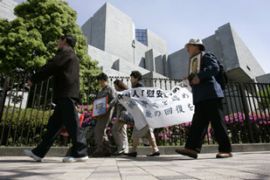Japan rules against war victims
Court verdicts deny World War II “comfort women” and forced labourers compensation.

Published On 28 Apr 2007
It said their right to reparation ended when Japan and China normalised their diplomatic ties in 1972, when Beijing renounced claims for war damages.
| Related link |
The ruling came hours after the chief court used the same reason in rejecting demands from individual Chinese for compensation from Japan after being forced to work as labourers in Japan during the war.
In this specific case, the two women from the northern province of Shanxi were abducted and repeatedly raped by Japanese soldiers in 1942, according to the ruling.
They had been seeking 46 million yen ($390,000) in damages. One of the women died in 1999 and her family carried on the lawsuit.
Furore overseas
Shinzo Abe, Japan’s prime minister, now in Washington for a summit with George Bush, the US president, set off a furore overseas when he denied in March that there was evidence the government or military were directly involved in kidnapping the women.
Abe has since apologised for their suffering and repeated that he stands by a 1993 apology acknowledging official involvement in setting up and managing the military brothels.
|
“We’ve lost but we will continue to struggle with Nishimatsu to the bitter end” Song Jiyao, 78, former forced labourer |
Many historians say thousands of women, mostly Asian, were forced to work at the wartime brothels.
Labourers lose Earlier on Friday, the Japanese supreme court overturned a lower court ruling that had ordered a Japanese company to compensate Chinese slave labourers who were forced to work in Japan during World War II.
In 2004, the Hiroshima high court ordered Japanese construction firm Nishimatsu Construction Co Ltd to pay a total of 27.5 million yen ($230,000) to a group of five Chinese in compensation for forcing them to work in Japan during the war.
Shinzo Tsuchiya, a supporter of the former labourers, said: “The ruling is disgraceful in light of friendly relations between Japan and China.”
Nishimatsu had argued that the statute of limitations had expired on violations of obligations to ensure safe working conditions for the workers.
Company ‘victory’
A Nishimatsu official said: “We have not yet seen the judgment so we cannot comment in detail. But it is a victory for our company, so from that point of view we think it is an appropriate verdict.”
The plaintiffs are among 360 Chinese forcibly brought from China to work in Japan in July 1944. Most of them worked at a Nishimatsu hydroelectric power plant construction site in western Japan until the end of the war in 1945.
Song Jiyao, 78, who lost his eyes in an accident while doing forced labour, said: “We’ve lost. But we will continue to struggle with Nishimatsu to the bitter end.”
Acknowledging that the Chinese labourers had gone through “extremely grave mental and physical sufferings”, Ryoji Nakagawa, the presiding judge, suggested that Nishimatsu work to provide relief to the plaintiffs.
Source: News Agencies